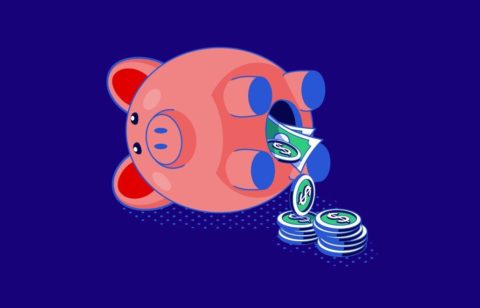Have you had low bank account balances lately or felt stressed about a credit card statement? Are you still financially recovering from the pandemic? Or maybe your debt is on the rise and you’re getting phone calls from creditors or debt collectors? It’s important to remember that you’re not alone and there are solutions to help you through this.
Many people in today’s tough economy are trying to find financial stability. Debt relief strategies that work are needed more than ever. Let’s look at some debt relief programs to find out what they are and if they really work.
Types of Debt Relief Programs
There are five types of debt relief programs: Debt consolidation loans, balance transfers, debt management plans, debt negotiations or settlements and bankruptcy.
Debt Consolidation Loans
Debt consolidation loans allow you to borrow money to pay off your debt. There are two types of these loans: secured and unsecured.
Personal loans are unsecured loans. If you have excellent credit, it’s currently possible to get a personal loan with an interest rate as low as 5.85% (Experian, 2023). These loans have fixed payments and fixed terms of three or five years. This way, you’ll know exactly when the loan will be paid off and when you’ll have the debt relief you’ve been working toward.
If your credit isn’t so great, but you own a home with some equity, you could get a secured loan like a homeowner equity line of credit or a home equity loan. The national average interest rate for a $30,000, fixed-interest home equity loan is currently 4.74% (Federal Reserve, 2023). The average interest rate for a $30,000 home equity line of credit is also 4.74% (Federal Reserve, 2023).
How do you know if a debt consolidation loan is right for you? First, calculate the average interest rate that you’re currently paying on your credit cards. For example, if you have four credit cards and their interest rates are 15%, 19%, 17%, and 18%, your average interest rate is 17.25%. A personal loan at 9% would give you lower monthly payments. A home equity loan or line of credit would also provide lower monthly payments but would take more time (up to 30 years) to pay off all of your debt.
Balance Transfers
If you have credit card debt with high interest rates, you may be able to transfer those balances to a new card with a lower interest rate. To see how this could work for you, calculate the average interest rate on your current credit cards and then compare that average with the interest rate on the new card.
If you have good credit, you may qualify for a 0% balance transfer card, which could offer as much as 18 months interest-free. Within that time, you may be able to pay off the new balance. However, after that time, the introductory period ends and the interest rate may increase dramatically.
Debt Management Plans
A debt management plan (DMP) is just that—a plan for managing your debt! While you could try and create a plan on your own, many people who have large debts choose to go to a consumer credit counseling agency for a DMP. If you choose this route, you’ll be assigned a counselor who develops a plan and presents it to your creditors. The counselor will typically negotiate with them to get interest rates reduced and fees waived.
Once the creditors sign off on the plan, you will stop paying them directly. Instead, you’ll make a fixed monthly payment—that is typically lower than the sum of the payments you were making previously—to the credit counseling agency that has consolidated your debts.
A potential downside to this type of debt relief is that you’ll likely see all of your accounts closed. Your creditors may allow you to keep one credit card open to use in case of an emergency.
It typically takes four to five years to complete a debt management plan.
Debt Settlement
In debt settlement, a company contacts each of your lenders directly and offers a lump sum payment to settle your debt for less than you owe. This type of debt relief has become very popular as it’s the only way to save a substantial amount of money. All other debt relief programs merely transfer your debt from one set of creditors to another.
While it is possible to settle your debt on your own, most people choose to use a debt settlement company. There are several reasons for this. First, settling debt on your own means you would need to have cash on hand for lump-sum settlements. If you choose a debt settlement company, you would instead make a fixed payment each month to a single consolidated escrow-type account. Second, using a debt settlement company relieves you from the stress of dealing directly with your lenders.
Debt settlement companies do charge fees that typically range from 15% to 25% (American Fair Credit Council, 2023).
On the downside, debt settlement will harm your credit score, potentially lowering it by as much as 80 points. You may find out more about how debt settlement works with National Debt Relief.
Bankruptcy
With bankruptcy, a bankruptcy attorney handles the process for you. The most popular type of bankruptcy is Chapter 7, in which almost all your unsecured debts will be discharged. These debts included credit cards, personal loans, personal lines of credit, payday loans, old cell phone bills, collection agency accounts, business debts, medical bills and other unsecured debts.
Bankruptcy will not help with secured debts like auto loans or mortgages. It will also not discharge alimony, family support, spousal support, past due taxes or student loan debt. Chapter 7 bankruptcy takes about four months to complete and typically costs anywhere from $350 to $500 (U.S. Courts, 2023).
Do these debt relief options really work?
Yes, debt relief plans really do work, but each has its own benefits and drawbacks, so it’s important to do your homework to choose the plan that works best for you.
Frequently Asked Questions about Debt Relief
Q: How does debt relief affect credit?
A: It depends on which debt relief program you choose. If you choose a debt consolidation loan or a balance transfer, they could have a positive effect on your credit. A debt management plan may help your credit or damage it, depending on whether your DMP is reported to the three credit bureaus. Debt settlement and bankruptcy will hurt your credit—with bankruptcy being the most harmful.
Q: Which debt settlement company is the best?
A: Topconsumerreviews.com analyzes debt relief companies yearly and ranks their top 10 results. This year it ranked National Debt Relief as the best with five stars, stating, “National Debt Relief is our top-rated debt relief company. They are BBB Accredited, in business since 2009, and they’ve helped over 100,000 customers get out of debt.”
Q: Why choose debt relief?
A: If you feel overwhelmed by debt, debt relief may be the way to go. It’s a great choice for people who struggle to stay on top of their bills or feel as if the pressure of debt will never go away. The good news is that there are several available options.
Q: Are debt relief companies trustworthy?
A: Yes, many debt relief companies are trustworthy. As noted above, one of the best options is National Debt Relief. Other legitimate debt settlement companies include Cure One Debt Relief Services, Curadebt and Avant.
Q: Where can I go for debt relief?
A: There are several places to go for debt relief. Banks and savings institutions, consumer credit counseling agencies and debt settlement companies may all be helpful options depending on your specific needs.
Q: What do debt relief companies charge?
A: This will depend on which form of debt relief you choose. Banks generally charge anywhere from 5.75% to 12% for personal loans, home equity loans, and homeowner equity lines of credit. If you qualify for a 0% interest transfer card, the cost will be zero until your promotional period ends. Non-profit credit counseling agencies can charge a monthly fee to administer your DMP that will vary from $0 to $50. Debt settlement companies charge a flat fee ranging from 15% to 25%. Bankruptcies typically cost less than $500.







